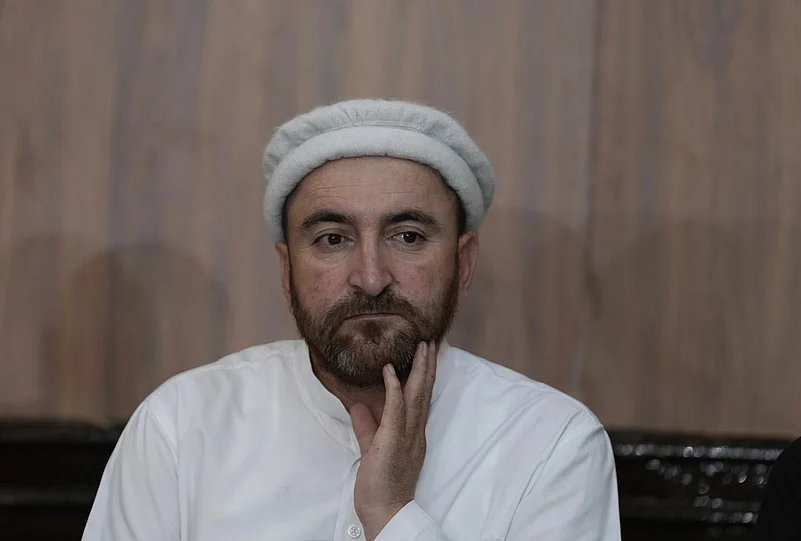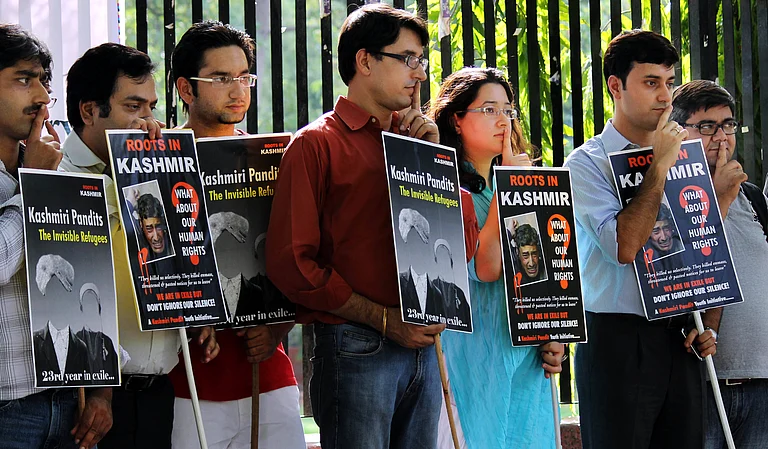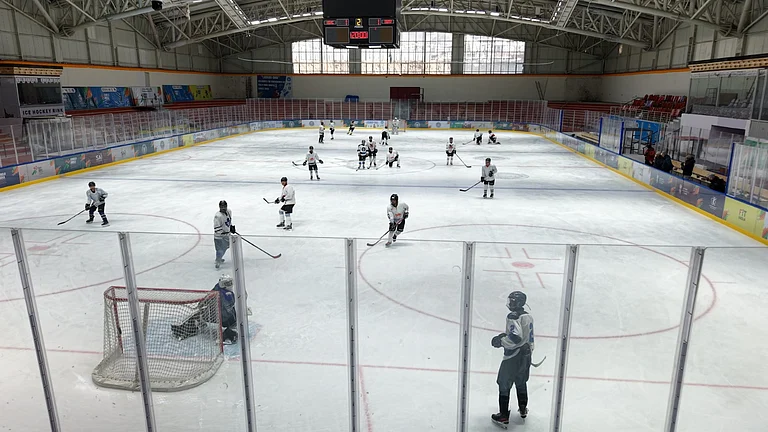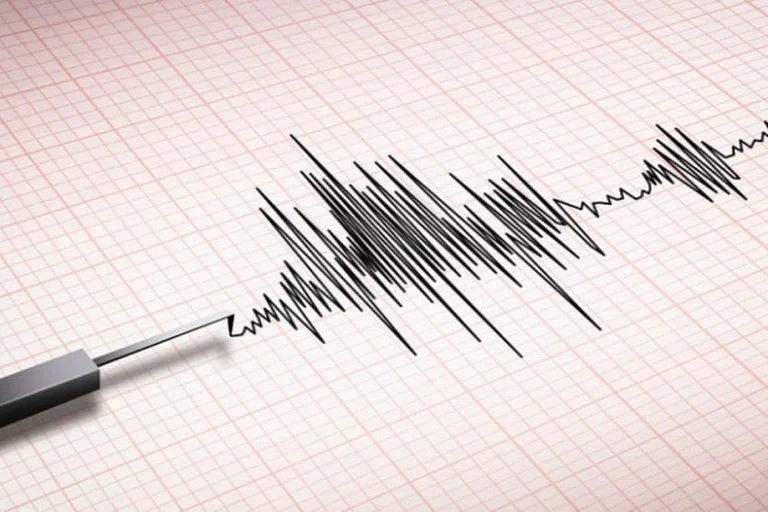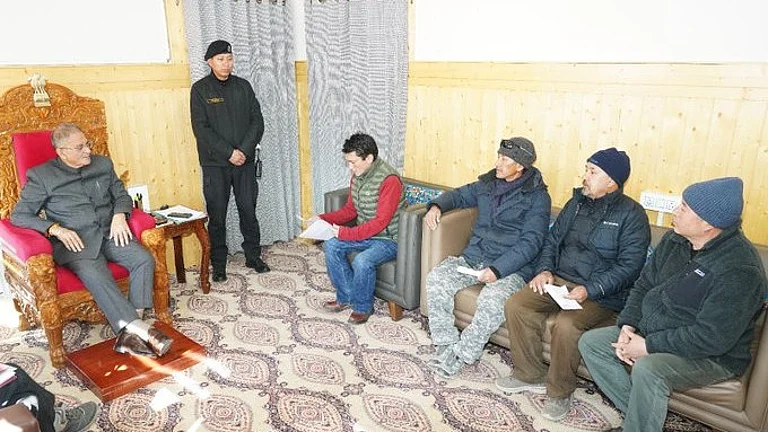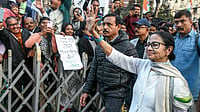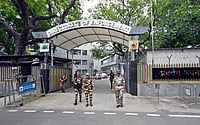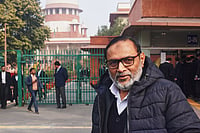
Summary of this article
Ladakh has become totally voiceless. And they have imposed a bureaucratic rule with no accountability in Ladakh, which has created a sense of trust deficit, insecurity, and frustration among the youth and the people of Ladakh.
There were differences, and there may still be some differences today. But for the larger interest of Ladakh and for the existence of the Ladakhi community, as a community, as an ethnic identity, we are the same. We share the same cultural history.
Without statehood, the Sixth Schedule remains incomplete. Because we don't want this idea of a Union Territory where one LG decides everything
Sajjad Kargili is a founding member of the Kargil Democratic Alliance (KDA), an alliance that is demanding statehood and Sixth Schedule protection for Ladakh, which, following the 2019 reorganisation of Jammu and Kashmir, was turned into a Union Territory without legislative powers. In this interview with Avantika Mehta, Kargili discusses the frustrations of Ladakh’s citizens, including the sense that they are voiceless under bureaucratic rule, and how the fight for statehood has united the UT’s population across religious and regional lines.
In the interview, Kargili has emphasised that statehood and Sixth Schedule protections are essential and complementary measures, and that the KDA is not willing to compromise on either of these demands. The Ladakh leader criticises the ruling party’s government for not honouring its past promises and making key decisions without the consent of the local people, specifically land and development projects.
What are your past experiences which you think have shaped your current approach for this movement?
The government took the decision in August 2019 to bifurcate Jammu and Kashmir into two Union Territories, which resulted in Ladakh losing its statehood and becoming a Union Territory without legislative powers.
And Ladakh has become totally voiceless. And they have imposed a bureaucratic rule with no accountability in Ladakh, which has created a sense of trust deficit, insecurity, and frustration among the youth and the people of Ladakh. Today, we see that people in both Leh and Kargil are united in their demands for statehood and the Sixth Schedule.
Ladakhis want democratic rights, and we are struggling for our democratic and constitutional rights. The Sixth Schedule was promised by the BJP government in August 2019. They fought two elections that year: one in Leh and the 2019 parliamentary elections, but have failed to deliver on their promise to the people of Ladakh. All are united.
Is this a Gen Z movement as described in the media?
There is no particular age group. Some media houses are trying to portray that there is a Gen Z protest or blah blah. But it has nothing to do with any age or group. This protest is a demonstration by the people of Ladakh.
All groups, all sects, all religious ethnic identities.
How united do you think the people of Ladakh, across Leh and Kargil, are behind these demands? Is there some friction between the minority religious groups, such as the Buddhists and the Muslims? Or are there any significant regional differences that we should be aware of?
There were differences, and there may still be some differences today. But for the larger interest of Ladakh and for the existence of the Ladakhi community, as a community, as an ethnic identity, we are the same. We share the same cultural history. Of course, there are differences on religious grounds.
Some are Buddhists, some are Muslims, some are, you know.
Could you expand on that for me, sir?
Like we had earlier in Kargil, a Muslim-dominated, Muslim-minority area, and Leh is a Buddhist-minority. However, the language is almost identical.
We understand each other's language. We share the same history, same culture, same identity. So it's very hard to, you know, divide Ladakhis on the basis of their... Sometimes, we have had religious differences, and declarations of interest occur during MP elections every five years.
However, aside from that, there is no significant difference between the two communities. I think because we see that our existence is in danger. We don't have any constitutional safeguards for our land, our jobs, and our livelihoods. We don't have any representation.
Earlier, we had some representation in the Jammu and Kashmir Assembly. We used to have four members of the Assembly and one member of the Legislative Council. We were part of the decision-making in the Jammu and Kashmir State.
Now, these bureaucrats, four or five in number, have been appointed by the central government and are making decisions without considering the people of Ladakh. And they are imposing those policies which have threatened the Ladakhi identity, Ladakhi culture, and democracy in Ladakh. And the Ladakhis feel that they become voiceless, and they feel that they are being betrayed.
Could you summarise the movement's core demands? And also, which of these demands do you see as non-negotiable?
We want statehood because we want democracy. Earlier, we were a state.
We want our representation. We want our own assembly so that we can do legislation and policy-making for our own region. Number one, that's our demand.
The second, which is non-negotiable, is the Sixth Schedule, which the BJP and then Tribal Minister Arjun Munda promised. The Tribal Affairs Ministry also recommended granting Ladakh Sixth Schedule, and the BJP won two elections because of this promise. The Sixth Schedule is not negotiable for us.
We will do our best, and we will not negotiate on this demand either. The third one is that we need the Public Service Commission. To date, there is no Public Service Commission (PSC) in Ladakh.
Currently, there is no Public Service Commission (PSC) in Ladakh. Previously, in the Jammu and Kashmir State, we had the JKPSC for officers such as the Kashmir Administrative Service, Police Service, and Forest Service; however, no recruitment has taken place or posts filled in Ladakh.
And the fourth one, we need a Parliament seat for Bodle and Kargil. Because if you look at Ladakh geographically, our constituency is the largest in India. And Ladakh is three times bigger than Kashmir. So, we need at least two members of Parliament. Both can represent both the regions.
We hope that the government of India will consider all four demands with wisdom and a sensible approach, addressing them as soon as possible. And they will avoid further creating chaos and tension. They did it by arresting Sonam Wangchuk and several other of leaders of our apex body. And we demand the immediate release of those who have been arrested and taken into custody.
Some people have emphasised statehood for Ladakh, while others are emphasising Sixth Schedule protections. Which one would you prioritise and why?
Yes, the Sixth Schedule is good. However, without statehood, the Sixth Schedule remains incomplete. Because we don't want this idea of a Union Territory where one LG decides everything. So, tomorrow the government will grant us the Sixth Schedule, but the ultimate power will be held by the LG administration. He can manipulate anything, anywhere. So, therefore, we need statehood.
And then, after that, we also need the Sixth Schedule.
And what concrete protections would the inclusion of Ladakh under the Sixth Schedule offer Ladakhis that the current arrangement does not?
For example, we have a tribal population. More than 90 per cent of the people are tribal. We have our customary laws. Protecting our tribal land is very important. And we want that protection as soon as possible.
Next, we want the government to cancel all projects for which an MOU has been signed before granting the Sixth Schedule. They should at least first announce the Sixth Schedule and then, with the consent of the Ladakhi people, invite all industries from outside. So that anyone can come with the consent of the local health council and local bodies.
However, without their consent, we are not satisfied and will oppose any kind of outsider investment. In the name of investment, they come and grab the land through the LG administration or through the bureaucrats, who we have not elected. The people of Ladakh have not been elected.
We are not against the development. However, development should be sustainable and conducted with the consent of local leadership and representatives.
How effective have the High Power Committee's talks been with the Ministry of Home Affairs so far? Have there been any commitments which have been made by the Home Affairs Ministry on record?
Sadly, to date, we have not achieved anything concrete. As we know, they have fulfilled two of our demands: the reservation issue and the missile issue. We have discussed and we have finalised it. However, these demands have been issued through executive orders, not constitutional mandates. This means that these executive orders can be amended at any time. It's not permanent.
What are the sticking points on the negotiating table then for you and the Ministry of Home Affairs?
We used to discuss granting statehood and the Sixth Schedule, and we also discussed the resentment among the people regarding these demands, as well as the sensitivity of the region.
However, we have seen time and again that the government mostly avoids and does not positively react to these demands. Although we often receive verbal assurances, today we are in Delhi because we are sincere about the dialogue. Because if the CRPF, four of our protesters were killed in this firing during this last stage, but still we are here because we are very serious about the dialogue.
We demand that this dialogue be meaningful and productive. To date, we have not seen any concrete resolution of our demands during these meetings.
Would a concrete resolution involve something like a compromise, such as a time-bound roadmap to statehood, for example?
I believe the Centre lacks a clear vision. They don't have a roadmap for the people of Ladakh. I don't see anything. I feel that the people of Ladakh will never compromise on their demands, and the government should understand the sensitivity of the region and its strategic importance. They should not push people towards the wall. That's what I feel.
What do you mean, push people towards the wall?
Means ignoring, betraying and creating a sense of insecurity and sense of alienation among the people. We think the government is trying to disenfranchise the people. We should not have it.
Ladakh has a very strategic location for the Centre. One might assume that they would be reluctant to devolve power due to national security concerns. What would be your response to that?
We had the powers earlier, too. Federal structures always serve to strengthen national interests. Because when we see the national interest, the Ladakhis are the natural defence of this country. They are an army without uniform. If the government does not grant rights to the people, if it consistently betrays them, pushing them towards the wall by alienating and disenfranchising them, it will create a greater sense of insecurity among the people.
It will create a trust deficit among the people regarding the government. If they strengthen and empower people, it will also strengthen and empower their faith in democracy.
What about the Ladakh Autonomous Hill Development Councils (LAHDC)?
It's totally powerless today. It's powerless. The business rules have not been defined yet. There has been no business rule in place for 60 years between the Hill Council and the UT administration.
Right, so do the locals want more elected power or a different institution entirely?
No, locals want assembly. Just going on to the recent protests, they became violent, and as you said, four protesters were killed by security forces.
How would you explain this escalation from peaceful protests to such a deadly clash?
The government and the UT administration are responsible, as you may not be aware, but a month ago, we held a press conference and asked the government why this CRP deployment was happening in Ladakh and what their response was. A month ago, they brought some deployment from the CRP deployment. They conducted CRP deployment in Ladakh, and we asked the government, both the ADA and the Apex body, why they were doing this deployment. They replied that it was for security in Ladakh.
And yesterday, DGP Sahib held a press conference, and he stated that this was expected, as we had been aware of it earlier. So my question is, if the Apex body, on September 23, had already done a press conference, we are going for a ban tomorrow, and they called people to come for a protest, so why did they not take... and they stopped people from assembling and who ordered to fire on them? So, there should be a high-level, impartial judicial probe.
What kind of an independent investigation do you want?
It should be an impartial judicial probe, and those responsible for the firing should be brought to justice.
How has Sonam Wangchuk’s arrest affected the movement's morale?
The people... It will spread even more. People are angrier, and they are very strong because Sonam Wangchuk's arrest has given them more strength. We were thinking that the movement was acting with sensibility and wisdom, but his arrest and the baseless accusation against our movement and Sonam Wangchuk have created even more anger among the people. These are not provocations on my side.
The government had said that he had made some provocative speeches. Have they shared with you any evidence or any public evidence?
Not yet, not yet. These are baseless accusations, similar to those made by protesters during the Farmer protests and the CAA protests. Additionally, we are seeing protests in the Gilgit-Baltistan area, where nationalist leaders are also engaging in protests. The Pakistani authorities also blame them for the same by calling them Indian supporters. So here in Ladakh, they are calling us the Pakistani supporters, calling Sonam Wangchuk a Pakistani supporter.
In Gilgit-Baltistan, the protestors are being called by the Indian supporters. So you can understand the level. This is politics, and it's all politics.
They are trying to divert attention and defame our movement.
Has his detention changed the leadership structure or the decision-making of the movement on the ground?
No, no. It will be stronger.
Our leaders, our youths, and our religious bodies are more conscious and serious, and our youths are also more aware, serious, and conscious, and we are more united. These detentions did us a favour by uniting us more and making us more aware of the government's intention.
Ladakh is often described as having a Buddhist majority in Leh and a Muslim majority in Kargil, as you have also said. How has the demographic split affected the politics of demand, as well as the everyday intercommunal relations between these two communities?
No, not at all. No, because today, in Ladakh, we all feel that all demands are connected to our existence. So both Muslims and Buddhists feel that these are our own common demands and we are all fighting for our own future.
And have there been any communal tensions which have emerged from this protest wave or have, for example, the leaders of the movement actively done anything to prevent that?
No, we have seen recently that the problem has erupted in Leh. As you told, in the Buddhist majority region, those who have been killed during the firing all four are Buddhists. There are some injured who are Muslims from Kargil.
But when we saw the reaction, the reaction from all sides was the same. The anger from all sides is the same. And the religious bodies from Kargil visited Leh and met with the injured people, the Hill Council representatives and we, the KDA, also visited the injured and also the families who have lost their sons during this.
And there is complete unity among the people. We have seen in all Friday sermons across Kargil that they have strongly condemned these events. The firing incident killing of our youths and injuring of our people.
It has more unity. People are united behind these four demands, and they believe that these demands are crucial for Ladakh's future.
Would you welcome an international rights or environmental organisation to monitor this situation?
No, we would not. Because it's our internal problem. And we, as Indians, believe in our democracy, our constitution, our own civil society, and our own political leaders. And the support we are getting, from Mumbai to everywhere in the country—that's enough. We also want to avoid any outside interference.


